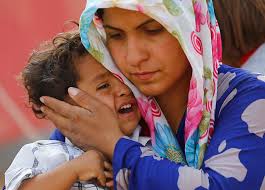
Samira Hakimi
Samira Hakimi, her sister Nazifa, their respective husbands, and Samira’s two children were threatened by the Taliban in their home country, Afghanistan. The Hakimi family established and ran a high school and a private university, based on Western curricula, media of instruction English and Dari. The schools more than welcomed, they encouraged women to attend. For example, they offered more than half of their scholarships to women. For three years, the family weathered intensifying Taliban threats. Finally, last year, they fled Afghanistan. At the time of their departure, Nazifa was pregnant. In December, they crossed from Mexico into the United States and applied for asylum. They were all detained. Samira Hakimi, her 4- and 8-year-old children ended up in Karnes County Residential Center, as did her sister Nazifa and her newborn child. The husbands were detained elsewhere in Texas. In late May, Samira Hakimi and her two children were afforded asylum. Not her sister, nor her sister’s ten-month-old son, nor the husbands. Samira Hakimi knows why she was kept for six months, and why her family is still inside: “They told us you will only be a couple of days in there. I never thought that I would be detained here for such a long time. That I’m detained here because I’m from Afghanistan and that’s all. But I’m human.” Why does the United States hate Samira Hakimi, her sister Nazifa, and their young children?
The State is not supposed to hold families in detention for long periods of time. A federal judge arrived at that decision last year, and, as of now, that decision still holds … except that it means less than nothing in the immigration gulag. How is one supposed to respond when one is six months into a maximum three months’ stay in prison? What is one supposed to do when one’s children suffer day in day out, asking when they’re going to leave? How is one supposed to breathe surrounded by ever thickening despair? Samira Hakimi tried asking questions: “Here, no one talks to us. They don’t give us the reason why I’m detained in here. I never thought that I would be detained here for such a long time.” After months of no response, Samira Hakimi decided to take her own life, thinking that if she died, her children would be released from detention. She was found; taken to hospital, under guard; and then returned to Karnes.
Last week, Samira Hakimi and her two young children were released from Karnes, and are now `free’ in San Francisco. Samira Hakimi is 31 years old.
Two years ago, almost to the day, 19-year-old Lilian Yamileth Oliva Bardales, a Honduran asylum seeker also held in Karnes, tried to commit suicide. She and her four-year-old child had been in Karnes since October 2014. Lilian Oliva Bardales left a note, part of which, translated, read: “I write this letter so you know how it feels to be in this damn place for 8 months. You don’t understand that people’s lives have no price and you cannot buy it with money. You don’t have a heart for anybody. You just lie and humiliate all of us who have come to this country.” That was two years ago.
Since then, the situation has only grown more toxic. Laws against the detention of minors are routinely, and increasingly, ignored. Immigration detention death rates are skyrocketing. From October 1, 2015 to September 31, 2016, 10 people died in immigrant detention centers. From October 1, 2016 to the end of May, a week ago, eight people have already died in ICE custody.
Why does the United States hate Samira Hakimi and her family? Because they’re Afghan. Why does the United States hate Lilian Oliva Bardales and her son? Because they’re Honduran. Why does the United States hate Samira Hakimi, her sister Nazifa, Lilian Oliva Bardales, and their children? Because they’re vulnerable women and children who asked for help, because they’re human.

(Photo Credit: Grassroots Leadership)
